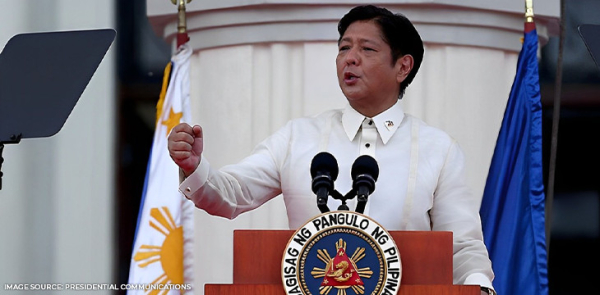Philippine SONA 2024: Ferdinand Marcos Jr. says country embraces AI, digitalization

In his third State of the Nation Address (SONA), Philippine President Ferdinand “Bongbong” Marcos Jr. emphasized the nation’s progress in artificial intelligence (AI) and digitalization as key drivers of economic growth and development. Marcos highlighted several initiatives and legislative measures that have paved the way for investments and job creation, transforming the Philippines into a burgeoning digital economy.
The CREATE Act: A catalyst for investment and job creation
“The CREATE (Corporate Recovery and Tax Incentives for Enterprises) Act has generated investments amounting to over PHP 1 trillion ($17.11 billion) and created more than 100,000 new jobs,” Marcos stated. The success of the CREATE Act has inspired the introduction of the CREATE MORE (Maximize Opportunities for Reinvigorating the Economy) Act, aiming to build on this momentum and further stimulate economic growth.
In May, the Philippines’ House of Representatives passed a bill amending the CREATE Act. The CREATE MORE amendment makes key enhancements to the tax regime introduced in the CREATE Act, which was enacted in April 2021. The law grants tax relief for companies in financial need in the wake of the COVID-19 pandemic.
Marcos pointed out that the conscious efforts to streamline business operations and government services through digitalization have had a multiplier effect. “Cost savings from operations have translated to higher revenues and faster transactions,” he noted. These improvements have addressed the long-standing issues of fragmented and overlapping procedures, enhancing productivity across various sectors.
Digital transformation in government services
Marcos said that one of the achievements of the digitalization drive is the increased efficiency in government services. “More and more systems are now digital and cashless, benefiting individuals, MSMEs, and agricultural workers alike,” he said. This shift has expedited transactions and commercial exchanges, making processes more convenient for all parties involved.
The President highlighted the success of initiatives like the Bangko Sentral ng Pilipinas (BSP) Paleng-QR program, which has gained traction among the public, and the Anti-Financial Account Scamming Act, which bolsters the Cybercrime Prevention Act. This new legislation aims to protect the public by enhancing the security systems of banks and financial institutions and imposing severe penalties on social engineering schemes and money mules.
Enhancing job placement and business registrations
The digitalization efforts have also positively impacted job placement and business registrations. Marcos highlighted the role of Public Employment Service Offices (PESOs), which have harnessed IT capabilities to improve labor industry coordination, boasting a job placement success rate of 98%. The streamlined processes have also led to a significant increase in new business and corporate registrations, including foreign firms.
Advancing infrastructure and energy projects
The approval and implementation of energy projects have moved towards complete virtual integration of required procedures.
“The expedited processing of our infrastructure flagship projects under the Build Better More program shall follow suit,” Marcos mentioned.
The digital infrastructure has been substantially strengthened, with the number of common towers more than tripling since last year, facilitating better connectivity and communication.
Streamlining air transport and tourism
Marcos also talked about the shift to paperless immigration and customs forms. “Soon, the piloted e-gates will be standard fixtures at airports, further facilitating ease of mobility during departures and arrivals,” Marcos announced. The implementation of the Philippine e-Visa is next on the digital transformation agenda, promising to streamline the entry process for tourists and business travelers.
Marcos emphasized the potential of the tourism sector. “Our infrastructure and digital reforms, along with the development of tourism sites and enhancement of the overall tourist experience, are all calculated to boost the productivity of the tourism sector,” he said. The focus is now on experiential tourism, including food, culture, heritage, the arts, and various niche markets like halal, diving, cruise, farm, and ecotourism.
Advancing technology in education
Technical Vocational Education and Training (TVET) is also seeing advancements. “Eight out of ten graduates of TVET land decent jobs, making it instrumental in maintaining our high employment rate,” Marcos noted. The Department of Education (DepEd), Commission on Higher Education (CHED), Department of Labor and Employment (DOLE), and Technical Education and Skills Development Authority (TESDA) have joined forces to incorporate TVET into the education system, promising great potential for the Filipino workforce.
The Philippine higher education system continues to gain international recognition. “Eighty-seven of our higher educational institutions have made it into various world university rankings, with 51 being public universities or colleges,” Marcos highlighted. Advanced learning systems and technologies, including robotics, artificial intelligence (AI), and the Internet of Things (IoT), are being introduced in TVET innovation centers nationwide.
Supporting startups and R&D
Marcos also underscored the government’s support for startups and research and development (R&D). “Relevant scholarships and R&D grants will continue to be available, aligned with our agenda to foster startups and commercialize R&D outputs,” he said. The government is also building essential infrastructure linkages to support the ethical development of AI systems for high-impact practical applications.
Marcos’ SONA underscored the transformative power of AI and digitalization in the Philippines. From enhancing government services and job placements to boosting tourism and education, the digital revolution drives the nation towards a more prosperous and efficient future.
In order for artificial intelligence (AI) to work right within the law and thrive in the face of growing challenges, it needs to integrate an enterprise blockchain system that ensures data input quality and ownership—allowing it to keep data safe while also guaranteeing the immutability of data. Check out CoinGeek’s coverage on this emerging tech to learn more why Enterprise blockchain will be the backbone of AI.